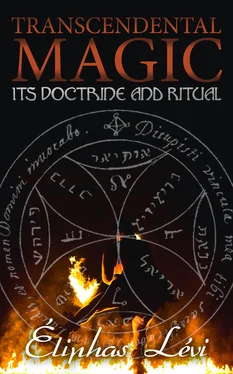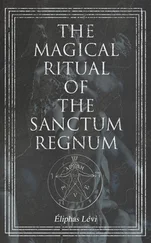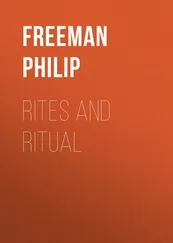The basilisk who slays by a look is no fable; it is a magical allegory. Generally speaking, it is bad for health to have enemies, and we can never brave with impunity the reprobation of anyone. Before opposing ourselves to a given force or current, we must be well assured that we possess the contrary force, or are with the stream of the contrary current; otherwise, we shall be crushed or struck down, and many sudden deaths have no other cause than this. The terrible visitations of Nadab and Abihu, of Osa, of Ananias and Sapphira, were occasioned by electric currents of outraged convictions; the sufferings of the Ursulines of Loudun, the nuns of Louviers and the convulsionaries of Jansenism, were identical in principle and are explicable by the same occult natural laws. Had not Urban Grandier been immolated, one of two things would have occurred: either the possessed nuns would have died in frightful convulsions or the phenomena of diabolical frenzy would have so gained in strength and influence, epidemically, that Grandier, notwithstanding his knowledge and his reason, would also have become hallucinated, and to such a degree that he would have denounced himself, like the unhappy Gaufridy, or would otherwise have perished suddenly, with all the appalling characteristics of poisoning or of divine vengeance. In the eighteenth century the unfortunate poet Gilbert fell a victim to his audacity in braving the current of opinion and even of philosophical fanaticism which characterized his epoch.
Guilty of philosophical treason, he died raving mad, possessed by the most incredible terrors, as if God Himself had punished him for defending His cause out of season. As a fact, he perished by reason of a law of Nature of which assuredly he knew nothing; he set himself against an electric current and was struck down as by lightning. Had Marat not been assassinated by Charlotte Corday, he would have been destroyed infallibly by a reaction of public feeling. It was the execration of decent people which afflicted him with leprosy, and he would have had to succumb thereto. The reprobation excited by the massacre of St. Bartholomew was the sole cause of the atrocious disease and death of Charles IX, while, had not Henry IV been sustained by an immense popularity, which he owed to the projecting power of sympathetic force of his astral life, he would scarcely have outlived his conversion, but would have perished under the contempt of Protestants, combined with the suspicion and ill-will of Catholics. Unpopularity may be a proof of integrity and courage, but never of policy or prudence: the wounds inflicted by opinion are mortal for statesmen. We may recall the premature and violent end of many illustrious persons whom it would be inexpedient to mention here. The brandings of public opinion may be often great injustices, but none the less they condemn their victims to failure and are often a death-sentence. On the other hand, acts of injustice done to a single individual can and should, if unatoned, cause the ruin of an entire nation or of a whole society: this is what is called the cry of blood, for at the root of every injustice there is the germ of homicide. By reason of these terrible laws of solidarity, Christianity recommends so strongly the forgiveness of injuries and reconciliation. He who dies unforgiving casts himself dagger-armed into eternity and condemns himself to the horrors of an eternal murder. The efficacy of paternal or maternal blessings or curses is an invincible popular tradition and belief. As a fact, the closer the bonds which unite two persons, the more terrible are the consequences of hatred between them. The brand of Althaea consuming the life of Meleager is the mythological symbol of this terrible power. Let parents be ever on their guard, for no one can kindle hell in his own blood, or devote his own issue to misfortune, without being himself burnt and made wretched. To pardon is never a crime, but to curse is always a danger and an evil action.
IX  I
I
Table of Contents
CHOKMAH DOMUS GNOSIS
THE INITIATE is he who possesses the lamp of Trismegistus, the mantle of Apollonius, and the staff of the patriarchs. The lamp of Trismegistus is reason illuminated by science; the mantle of Apollonius is full and complete self-possession, which isolates the sage from blind tendencies; and the staff of the patriarchs is the help of the secret and everlasting forces of Nature. The lamp of Trismegistus enlightens present, past and future, lays bare the conscience of men and manifests the inmost recesses of the female heart. The lamp burns with a triple flame, the mantle is thrice-folded and the staff is divided into three parts.
The number nine is that of divine reflections; it expresses the divine idea in all its abstract power, but it signifies also extravagance in belief, and hence superstition and idolatry. For this reason Hermes made it the number of initiation, because the initiate reigns over superstition and by superstition: he alone can advance through the darkness, leaning on his staff, enveloped in his mantle and lighted by his lamp. Reason has been given to all men, but all do not know how to make use of it: it is a science to be acquired. Liberty is offered to all, but not all can be free: it is a right that must be earned. Force is for all, but all do not know how to rest upon it: it is a power that must be won. We attain nothing without more than one effort. The destiny of man is to be enriched by his own earning and afterwards to have, like God, the glory and pleasure of dispensing it.
Magic was called formerly the Sacerdotal Art and the Royal Art, because initiation gave empire over souls to the sage and the capacity for ruling wills. Divination is also one of the privileges of the initiate; now, divination is simply the knowledge of effects contained in causes and science applied to the facts of the universal dogma of analogy. Human acts are not written in the Astral Light alone; their traces are left upon the face, they modify mien and carriage, they change the tone of the voice. Thus every man bears about him the history of his life, which is legible for the initiate. Now, the future is ever the consequence of the past, and unexpected circumstances do not appreciably alter results reasonably calculated.
The destiny of each man can be therefore foretold him. An entire existence may be judged by a single movement; a single oddity or weakness may be the presage of a long chain of misfortunes. Caesar was assassinated because he was ashamed of being bald; Napoleon ended his days at St. Heleua because he admired the poems of Ossian; Louis Philippe abdicated the throne as he did because he carried an umbrella. These are paradoxes for the vulgar, who cannot grasp the occult relations of things, but they are causes for the adept, who understands all and is surprised at nothing.
Initiation is a preservative against the false lights of mysticism; it equips human reason with its relative value and proportional infallibility, connecting it with supreme reason by the chain of analogies. Hence the initiate knows no doubtful hopes, no absurd fears, because he has no irrational beliefs; he is acquainted with the extent of his power, and he can be bold without danger. For him, therefore, to dare is to be able. Here, then, is a new interpretation of his attributes: his lamp represents learning; the mantle which enwraps him, his discretion; while his staff is the emblem of his strength and boldness. He knows, he dares and is silent. He knows the secrets of the future, he dares in the present, and he is silent on the past. He knows the failings of the human heart; he dares make use of them to achieve his work; and he is silent as to his purposes. He knows the significance of all symbolisms and of all religions; he dares to practise or abstain from them without hypocrisy and without impiety; and he is silent upon the one dogma of supreme initiation. He knows the existence and nature of the Great Magical Agent; he dares perform the acts and give utterance to the words which make it subject to human will, and he is silent upon the mysteries of the Great Arcanum.
Читать дальше

 I
I










